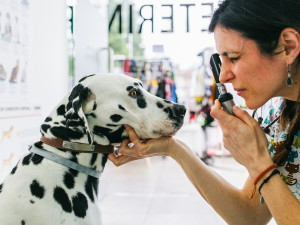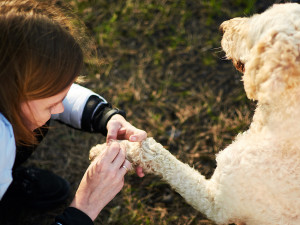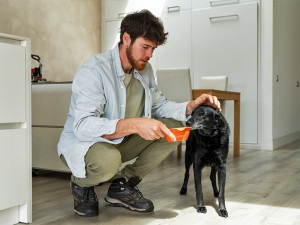Can Humans Get Dogs Sick?
Think of the amount of tissues you’d need...

Share Article
In This Article:
Can Dogs Get Sick From Humans? What Diseases Can Humans Transmit to Dogs? Can Humans Get Sick From Dogs? What Diseases Can Dogs Transmit to Humans? How to Help Keep Your Dog from Getting Sick
Humans and dogs have been cohabitating for thousands of years, from the early days of wild dogs picking up scraps around the campfire to today, when your floofy pal may share your bed, your lunch, and even kiss your face. With all of this intimate contact, it is no wonder that occasionally humans can transmit germs to their pups, or vice-versa.
Luckily, this is uncommon and most of the usual germs that make dogs sick don’t come from us. It’s important to know what germs can be contagious to your pup though so you can take precautions if you are sick.
Can dogs get sick from humans?
Dogs can get sick from humans sometimes but luckily this isn’t common. Many germs have evolved to be really good at infecting a specific host, which means that they cannot easily live in different species.

Even if they are able to infect species other than their primary host, they may not be as efficient, and may not cause the same symptoms or any symptoms at all. Of course, there are some exceptions where pathogens can easily jump species (thanks, COVID). It is important to know which ones to watch out for.
Can dogs and humans get the same sickness?
Yes and no. There are some germs that can infect both humans and dogs; however, they don’t necessarily get the same sickness. This is because certain germs may be able to infect other species that are not their primary host, but they may not cause the same degree of disease.
There are times where a dog may test positive for a disease that their human also has, but the dog has no symptoms at all. This can make it trickier to interpret whether the dog is actually sick and able to pass the infection to others, or if they were just exposed and will clear the infection quickly. There is still a lot to learn about how certain infections jump between different species and whether we need to be concerned about certain pathogens spreading between dogs and humans. For now, we do know that certain infections can be spread between humans and dogs.
What diseases can humans transmit to dogs?
It is important to know that every disease has unique characteristics as far as how it is spread and how it affects different species. Some diseases that are well-documented to spread between humans and dogs include the following:
Influenza
When humans get the flu, they primarily get influenza A, strains H1N1 and H3N2. There is some evidence that dogs can be hostsopens in new tab for these strains of the flu and shed the virus, potentially getting infected from humans or spreading it to others. This is not the most common form of flu for dogs, however. You may have read about outbreaks of canine influenza, which is strain H3N8, and is not transmissible to humans.
MRSA
Methicillin-resistant Staphylococcus aureus (MRSA) is a specific bacterial strain that is resistant to many common antibiotics, making it difficult to kill. Some people carry the bacteria on their skin or in their body, such as healthcare professionals who are exposed in the healthcare setting, people undergoing invasive medical procedures, or those with compromised immune systems.
People carrying the bacteria are not always sick from it, but can spread it to more vulnerable people who may be more at risk for getting an infection. There have also been documented cases of both humans and their petsopens in new tab, including dogs, testing positive for MRSA within the same household, so it is possible for the bacteria to spread between species.
This does not mean that dogs automatically get sick from the bacteria but they may have the bacteria on their skin or in their body. The risk with this is that if they do develop an infection or pass the bacteria to someone else who gets an infection, it is difficult to treat.
Tuberculosis
This is an infection caused by Mycobacterium. There are many different species of this bacteria that can cause infections in different animal species. Humans tend to get sick from Mycobacterium tuberculosis which can also infect dogs. This infection can be spread through airborne droplets when an infected person or animal coughs. Luckily, this is not a common disease among humans or dogs in the U.S.
Ringworm
Ringworm is caused by a fungal infection known as dermatophytosis. The spores of this fungus can be airborne as well as cling to fabric, skin, and fur and they are highly contagious. If a human has ringworm, it often looks like a scaly rash with a clear circular area in the center. Humans could spread ringworm to dogs or other pets in their household.
Salmonella
Salmonella is a bacterial infection that is most commonly acquired from eating contaminated food, such as undercooked meat, eggs, or raw produce. Dogs with Salmonella don’t always have signs of illness but they may experience digestive upset like diarrhea, vomiting, or a decreased appetite.
Other dogs can be carriers of the bacteria, meaning that they do not have any signs of illness but are shedding the bacteria in their saliva and poop and can spread it to other animals or humans. This includes risk of transmission when licking their favorite human, or if they have poop accidents in the home.
Can humans get sick from dogs?
Yes, humans can also get sick from dogs. The good news is that this is not a common problem for most pet parents. Lots of the diseases dogs get are not contagious to humans including canine parvovirus, most of the germs that cause kennel cough, distemper, or canine influenza. There are some conditions that are transmissible to humans, however, so it is important to educate yourself and take precautions if you think your dog may have a contagious disease.
What diseases can dogs transmit to humans?
There are a few important diseases to be aware of that are contagious to humans. This includes:
Rabies
Rabies is a virus that attacks the nervous system and is most often spread through the saliva of an infected animal that bites another animal or person. Without immediate treatment, it is nearly always fatal. In the US, rabies infections most often occur in wildlife like foxes, raccoons, skunks, and bats. In some other countries, stray dogs may be more likely to have rabies.
The good news is that there are highly effective vaccines against rabies for dogs. If your dog is up-to-date on their vaccinations, they are protected against rabies and also cannot transmit it to humans. If you or your dog are ever bitten by a wild animal, these bites should always be treated by a medical professional immediately.
Ringworm
This fungal infection is highly contagious and can be passed from humans to dogs, as well as from dogs to humans. Ringworm in dogs can look like patches of hair loss with scaly, flaky, or scabby skin. It is most commonly seen in puppies, senior dogs, and dogs with weakened immune systems, including stray dogs that may not have optimal overall health and nutrition. This is usually a mild disease and is easily treated.
Salmonella
Salmonella is a bacterial infection that is most commonly acquired from eating contaminated food, such as undercooked meat, eggs, or raw produce. Dogs with Salmonella don’t always have signs of illness but they may experience digestive upset like diarrhea, vomiting, or a decreased appetite.
Other dogs can be carriers of the bacteria, meaning that they do not have any signs of illness but are shedding the bacteria in their saliva and poop and can spread it to other animals or humans. This includes risk of transmission when licking their favorite human, or if they have poop accidents in the home.
Leptospirosis
This is a bacterial infection that can be spread through the urine of infected animals, most commonly rodents. Dogs may become infected by hunting rodents or drinking or swimming in contaminated water. An infected dog can theoretically spread the bacteria in their urine as well, although a human would have to have direct contact with the urine in order to get sick. There is an effective vaccine against this disease and it is often part of the core vaccines for dogs in many parts of the US, including major cities where rodents are all too common.
Intestinal parasites
Dogs are not known for their discretion when it comes to snacking on gross things, like dead animals, garbage, old leftovers, and even cat poop. As a result of their indiscretions, they may be hosts to a number of different intestinal parasites.
Each one has its own unique lifecycle and routes of transmission and some can be spread to humans if they improperly handle contaminated poop. Just another good reason to wash your hands and practice excellent hygiene.
How to help keep your dog from getting sick
While you can’t keep your pup in a bubble and protect them against any and all sickness, there are many proactive steps you can take to keep your dog healthy and free from many diseases. Of course, if your pup is acting sick, it is always important to get to the vet right away to prevent more serious complications. Some steps you can take to prevent illnesses include:
Schedule regular check-ups.
Making sure your dog is healthy and catching any medical conditions early helps to keep your dog in good overall health. All dogs should have a check-up at least once a year and puppies and senior dogs will need more frequent visits.
Keep vaccines up-to-date.
So many serious diseases are completely prevented with safe and effective vaccines. Be sure to stay on schedule with these vaccines, especially for young puppiesopens in new tab who are often more vulnerable. Speak with your vet if your lifestyle involves a lot of travel or rugged outdoor adventures as there may be additional vaccines that are necessary in these cases.
Use routine preventatives.
Year-round flea, tick, heartworm, and intestinal parasite preventatives are your dog’s best defense against so many of the creepy, crawly, and icky invaders your dog may encounter. Especially if you have a pup that goes to doggie daycare, runs in the woods, or vacuums up every scrap of garbage they can find, these preventatives will keep your dog healthy and protect your pocket against frequent trips to the vet.
Wash your hands and their paws.
Of course this may be a no-brainer, but be especially vigilant about washing your hands for at least 20 seconds when you are sick to avoid spreading germs to your housemates, whether they have two legs or four legs. You can also wipe your dog’s paws after coming in from the outdoors to prevent them from licking anything gross they may have stepped in.
Wear a mask.
It may feel silly to have to wear a mask if it’s just you and your dog at home, but if you are concerned that you have an airborne illness that could infect your dog, like the flu or COVID, wearing a mask can cut down on transmission to your dog.
Social distance from your dog.
This is a hard one, and maybe not possible, but as we have all learned through the Pandemic, keeping your distance is often the best way to prevent spreading certain infections. This may include avoiding face-to-face snuggles, licks, and even sleeping in the same bed for the most contagious period of your illness.
FAQs (People also ask)
How can I tell when my dog is sick?
Many times, you can tell right away if your dog is sick because they will have obvious signs of illness such as vomiting, diarrhea, loss of appetite, lethargy, coughing, sneezing, and/or difficulty breathing. Other times, there are more subtle changes like sleeping more, avoiding affection, hiding, or being reluctant to go for walks. If you notice any of these signs in your dog, it is important to see a vet right away.
Can dogs tell when you’re sick?
Dogs are so in tune to their person’s behaviors and routines that they will definitely pick up on anything that seems off. If you don’t stick to your normal schedule, if you smell differently, or if your mood shifts, they always seem to know. Some dogs can even sniff out specific diseases.
Can dogs catch a cold from humans?
The common cold in humans is typically caused by a virus called the Rhinovirus. This is not contagious to dogs.
References

Dr. Amy Fox, DVM
Amy Fox, DVM is a small animal veterinarian in New York City with over thirteen years of experience in a mixture of general practice, emergency medicine, and shelter medicine. A lifelong animal lover, Dr. Fox studied biology in college and then worked as a veterinary nurse before pursuing veterinary school at Cornell University. Her expertise includes surgery, dentistry, and management of chronic conditions, and she is interested in toxicology, pain management, nutrition, care of senior pets, and educational outreach. Dr. Fox also enjoys writing about veterinary medicine and teaching, and her work has previously appeared in Spruce Pets. In her free time, she loves to cook, garden, go for long runs, and hang out with her goofy mixed-breed dog May, who provides never ending comic relief!
Related articles
![Brown Labrador lifting front leg]()
How to Get a Head Start on Your Pet’s Health
Spot lumps, limps, and lethargy early on.
![Cavalier King Charles spaniel puppy running in a garden]()
Parvovirus: How to Identify and Treat Parvo Symptoms in Puppies
The potentially deadly virus can be prevented with one simple step.
![Young female veterinarian in her consulting room performing a medical examination on a dog for diabetes]()
How to Spot, Treat, and Prevent Diabetes in Your Dog
Learn which breeds are at risk, the symptoms to look out for, and what treatment options are available.
![A woman checking out her dogs paw.]()
Here’s Where Disease-Carrying Ticks Are in the US—And How to Keep Your Pup Safe
Simple preventive steps can go a long way toward offsetting their threats.
Can Dogs Get Concussions?
Yes, and the signs can be subtle. Here’s what to look out for.
Salmonella in Dogs: Can Dogs Get Salmonella?
What to look out for if they are sick from this bacteria.
When Can a Puppy Get a Rabies Shot?
And what you should expect after they receive it.
Can Dogs Get Fevers?
What to do to help them cool down and feel better.











